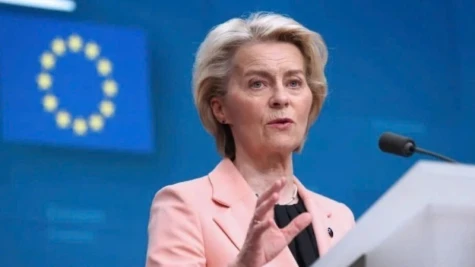At a record high of 307.4 trillion USD, global public debt is becoming a burden “holding back” the growth of many economies. Last week, Managing Director of the International Monetary Fund (IMF) Kristalina Georgieva called on Italy, France and Spain to conduct “austerity” measures to address the growing debt and financial deficit.
The Institute of International Finance (IIF) has just released a report estimating that global debt will reach 310 trillion USD by the end of this year, an increase of 25% over five years. In the third quarter, government debt posted its largest increase, while many countries recorded budget deficits at much higher levels than before the COVID-19 pandemic. About 65% of the debt rise in the past quarter was concentrated in developed economies, led by the US, Japan, France and the UK. Large emerging economies, such as China, India, Brazil and Mexico, also recorded sharp surges in public debt.
In Europe, the public debt ratio is still worrying in some economies that experienced a worse debt crisis, more than ten years ago, such as Spain and Italy. IMF Managing Director Kristalina Georgieva has just called on Italy, France and Spain to make more efforts to handle their debts. In an interview with the press, Georgieva said that the implementation of drastic financial measures in response to the COVID-19 pandemic increased the debt-to-GDP ratio and budget deficit in Italy, France and Spain.
Therefore, these countries need to commit to “austerity” and make financial adjustments to address the growing debt and financial deficit. As for Italy, the head of the IMF warned that the debt problem in the country has become serious as the growth rate is slowing down due to the government withdrawing policy support measures.
Meanwhile, the IIF report warns that debt-to-GDP ratios are rising in developing economies and that the government’s bad debt has reached record levels. Although the global debt-to-GDP ratio remained relatively unchanged at 333%, it reached 255% in emerging markets, or 32 percentage points above the same period five years ago, mainly due to public debts of Russia, China, Saudi Arabia and Malaysia. Besides, the IIF report notified that sovereign debt in default hit a record high of over 554 billion USD through the end of 2022, about half of which is bonded debt.
A worrying issue is that public debt is at risk of continuing to soar in the near future, partly due to the populist policies of some post-election governments. IIF experts calculate that there will be more than 50 elections taking place in 2024, including elections in the US, India, South Africa, Turkey and Pakistan. They emphasised that in the face of rising political polarisation and geopolitical tensions, forthcoming elections might pave the way for populist policies, such as loosening fiscal discipline and increasing government borrowing and spending, which will increase the burden of public debt on a global scale.
In addition to rising public debt, the burden on households and businesses is also increasing, especially in large economies such as China and the US. Public debt and the above types of debts have had and will harm the policies of many countries, limiting solutions to stimulate demand and thereby restraining the growth of the global economy. The debt problem becomes even more serious in the context of great power competition, armed conflict, and political instability, which is breaking out in many “hot spots” around the world, and the world economic growth is forecast to be low next year.
Last week, several major banks in the world predicted that global economic growth would slow down further in 2024 because of high interest rates and higher energy prices, as well as a slowdown in economic growth in both the US and China. According to a poll by Reuters, the world economy is forecast to grow by 2.9% in 2023 and 2.6% in 2024. Tightening monetary policy by the US Federal Reserve may adversely affect the future prospects of the world economy.
Meanwhile, China’s economic growth may weaken as companies look to move production out of the country to reduce costs. In addition, the conflict in Ukraine and escalating violence between Hamas and Israel will hinder global economic growth. In the above context, along with stimulating growth, controlling public debt is becoming an urgent task for most economies around the world.
NDO






























